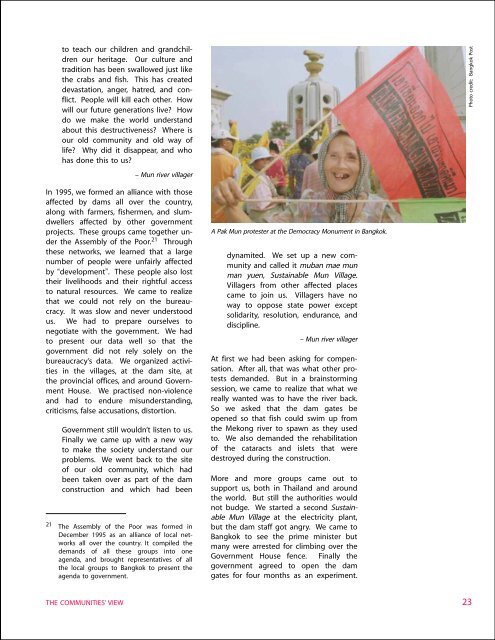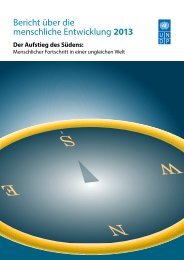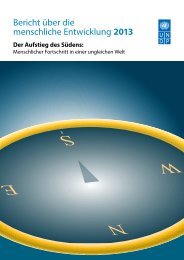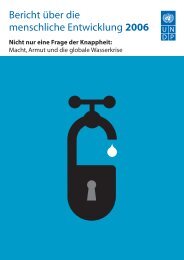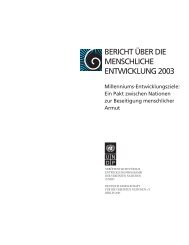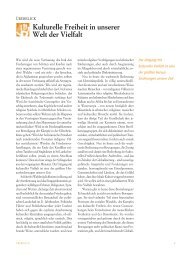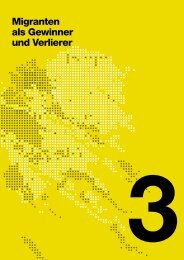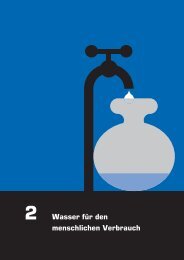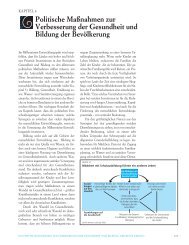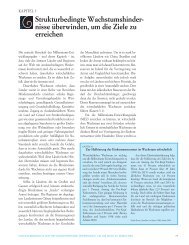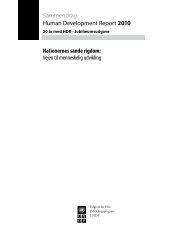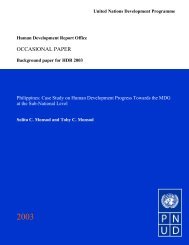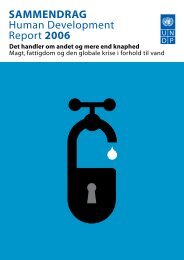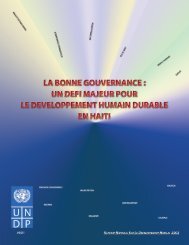THAILAND HUMAN DEVELOPMENT REPORT 2003
THAILAND HUMAN DEVELOPMENT REPORT 2003
THAILAND HUMAN DEVELOPMENT REPORT 2003
You also want an ePaper? Increase the reach of your titles
YUMPU automatically turns print PDFs into web optimized ePapers that Google loves.
to teach our children and grandchildren<br />
our heritage. Our culture and<br />
tradition has been swallowed just like<br />
the crabs and fish. This has created<br />
devastation, anger, hatred, and conflict.<br />
People will kill each other. How<br />
will our future generations live? How<br />
do we make the world understand<br />
about this destructiveness? Where is<br />
our old community and old way of<br />
life? Why did it disappear, and who<br />
has done this to us?<br />
– Mun river villager<br />
In 1995, we formed an alliance with those<br />
affected by dams all over the country,<br />
along with farmers, fishermen, and slumdwellers<br />
affected by other government<br />
projects. These groups came together under<br />
the Assembly of the Poor. 21 Through<br />
these networks, we learned that a large<br />
number of people were unfairly affected<br />
by “development”. These people also lost<br />
their livelihoods and their rightful access<br />
to natural resources. We came to realize<br />
that we could not rely on the bureaucracy.<br />
It was slow and never understood<br />
us. We had to prepare ourselves to<br />
negotiate with the government. We had<br />
to present our data well so that the<br />
government did not rely solely on the<br />
bureaucracy’s data. We organized activities<br />
in the villages, at the dam site, at<br />
the provincial offices, and around Government<br />
House. We practised non-violence<br />
and had to endure misunderstanding,<br />
criticisms, false accusations, distortion.<br />
Government still wouldn’t listen to us.<br />
Finally we came up with a new way<br />
to make the society understand our<br />
problems. We went back to the site<br />
of our old community, which had<br />
been taken over as part of the dam<br />
construction and which had been<br />
21 The Assembly of the Poor was formed in<br />
December 1995 as an alliance of local networks<br />
all over the country. It compiled the<br />
demands of all these groups into one<br />
agenda, and brought representatives of all<br />
the local groups to Bangkok to present the<br />
agenda to government.<br />
THE COMMUNITIES’ VIEW<br />
A Pak Mun protester at the Democracy Monument in Bangkok.<br />
dynamited. We set up a new community<br />
and called it muban mae mun<br />
man yuen, Sustainable Mun Village.<br />
Villagers from other affected places<br />
came to join us. Villagers have no<br />
way to oppose state power except<br />
solidarity, resolution, endurance, and<br />
discipline.<br />
– Mun river villager<br />
At first we had been asking for compensation.<br />
After all, that was what other protests<br />
demanded. But in a brainstorming<br />
session, we came to realize that what we<br />
really wanted was to have the river back.<br />
So we asked that the dam gates be<br />
opened so that fish could swim up from<br />
the Mekong river to spawn as they used<br />
to. We also demanded the rehabilitation<br />
of the cataracts and islets that were<br />
destroyed during the construction.<br />
More and more groups came out to<br />
support us, both in Thailand and around<br />
the world. But still the authorities would<br />
not budge. We started a second Sustainable<br />
Mun Village at the electricity plant,<br />
but the dam staff got angry. We came to<br />
Bangkok to see the prime minister but<br />
many were arrested for climbing over the<br />
Government House fence. Finally the<br />
government agreed to open the dam<br />
gates for four months as an experiment.<br />
Photo credit: Bangkok Post<br />
23


